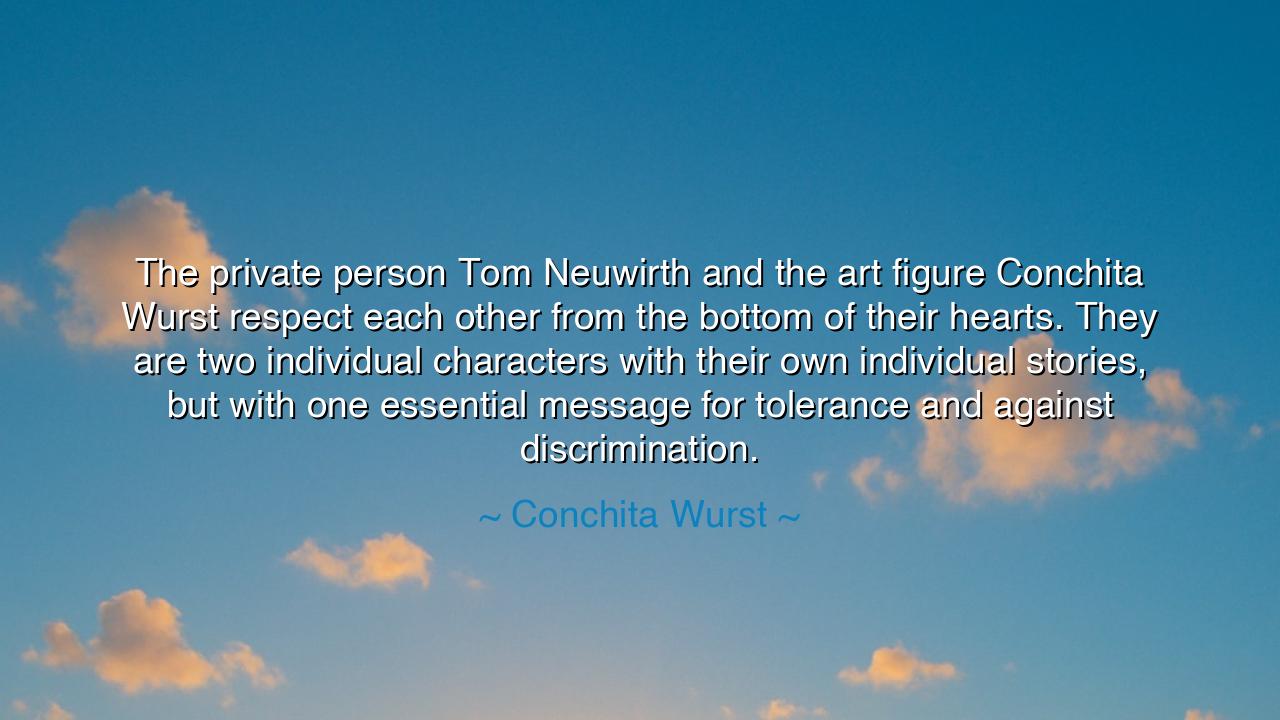
The private person Tom Neuwirth and the art figure Conchita Wurst
The private person Tom Neuwirth and the art figure Conchita Wurst respect each other from the bottom of their hearts. They are two individual characters with their own individual stories, but with one essential message for tolerance and against discrimination.






When Conchita Wurst declared, “The private person Tom Neuwirth and the art figure Conchita Wurst respect each other from the bottom of their hearts. They are two individual characters with their own individual stories, but with one essential message for tolerance and against discrimination,” these words shone with the ancient light of unity, of the reconciliation of dual selves, of the struggle to transform the personal into the universal. Here we hear not only the voice of an artist but the voice of humanity itself, yearning for wholeness, dignity, and justice.
In the quote, we are shown two beings: the private person Tom Neuwirth and the art figure Conchita Wurst. They are distinct, yet bound together, like the two faces of Janus in Roman myth, one gazing inward, the other outward. Tom is the mortal, with his personal trials, vulnerabilities, and quiet existence; Conchita is the radiant creation, the mask and the torch-bearer, who steps upon the stage of the world. Where many would see conflict between the private and the public self, here Conchita tells us of mutual respect—an inner harmony born of acceptance.
This harmony is not trivial. In every age, men and women have struggled with their divided selves: the role they play for the world, and the truth they carry within. The ancients spoke of Heracles, torn between the path of virtue and the path of pleasure; they spoke of Odysseus, at once a cunning strategist and a yearning wanderer. Conchita’s words reveal that unity is possible—that one may embrace both the private self and the public figure, not as enemies, but as partners in a greater mission.
The mission, as declared, is one of tolerance and the fight against discrimination. The art figure Conchita Wurst, with her striking appearance and bold artistry, is more than entertainment; she is a banner raised for those who have been silenced, mocked, or cast aside. Tom Neuwirth, the private soul, lends his strength and vulnerability to this figure, grounding her in truth. Together, they declare to the world that identity is vast, that human beings cannot be confined to one box or role, and that dignity belongs to all.
History offers a mirror in the life of Frederick Douglass, once a slave, who became both a private man and a public voice for freedom. He often spoke of the difference between his quiet self and his public figure, yet both were united in purpose: to proclaim liberty and equality. So too, Tom and Conchita, though distinct, join their stories into one essential message—an anthem not for themselves alone, but for all who suffer under prejudice.
The deeper wisdom here is that identity can be fluid, layered, and creative, without diminishing truth. To respect the many facets of the self is to find strength, not confusion. For when a person accepts their wholeness, they are no longer enslaved by fear or division, but become a living symbol of freedom for others. This is why Conchita’s victory at Eurovision was more than music—it was myth, a story retold in the modern age of courage rising against scorn.
For us, the lesson is clear: respect the many selves within you. Do not despise the private heart, nor deny the public voice. Do not fear contradiction, for out of contradiction may come harmony. Above all, commit yourself to the essential mission of humanity: to build tolerance, to break chains of discrimination, and to honor the dignity of every soul.
Practical wisdom follows: live authentically in whatever role you play, but let those roles serve the higher good. If you are private, tend your soul; if you are public, shine your light; if you are both, weave them together into a message of hope. Speak against injustice, create space for others to belong, and remember that every life, like Tom and Conchita, is both ordinary and extraordinary.
Thus, Conchita’s words endure as a teaching: the self is not one, but many, and in respecting each part of ourselves, we learn to respect the world. Two stories, one message: tolerance, dignity, and the triumph of love over hate. Let this be our legacy, as it is theirs.






AAdministratorAdministrator
Welcome, honored guests. Please leave a comment, we will respond soon